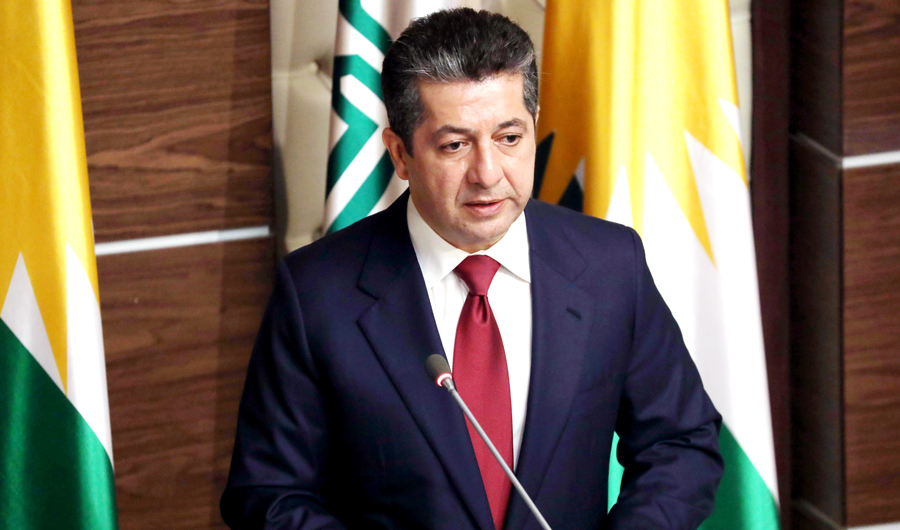IRBIL: Two years after a failed independence bid plunged Iraq’s Kurdistan Region into months of instability, the new regional prime minister said his priority was strengthening ties with Baghdad, signaling dreams of self-rule should be put on hold.
Masrour Barzani, sworn in as regional prime minister on Wednesday, told Reuters in an exclusive interview that under his leadership, the Kurdistan Regional Government’s focus would be to establish a “strong and constructive” relationship with Baghdad, leaving the question of independence aside for now.
“This (independence referendum) happened in the past and it’s a reflection of the enduring aspiration of a nation,” said Barzani, speaking at his palace in the hillside village of Salaheddine, near regional capital Irbil.
“However, the focus of my government will be how to build a stronger relationship and partnership with Baghdad,” he said, adding he would look to fix “those issues that were actually keeping us apart.”
The independence bid was led by Barzani’s father Masoud, who stepped down as Kurdish president in 2017 after the referendum backfired and prompted a military offensive from Baghdad.
At stake for the new premier are long-running disputes over independent oil exports, revenue sharing, security, and territory which have plagued ties between Irbil and Baghdad since a US-led invasion toppled Saddam Hussein in 2003.
Barzani was instrumental in orchestrating the September 2017 referendum, which was held over the objections of Baghdad and regional powers. It was seen as the culmination of years of oppositional politics by the semi-autonomous region.
The backlash was swift and pushed the country to the brink of civil war, threatening to undo the years of unprecedented autonomy the region had enjoyed. Relations eventually improved, cemented by a change of government in both capitals.
A ‘win-win situation’
The region’s oil exports have long been a source of contention with Baghdad. The Kurds, who control Iraq’s only northern pipeline, had been exporting oil independently since 2013. Exports were restarted in 2018, after a year-long freeze amid post-referendum disputes.
As part of the 2018 and 2019 budgets, the Kurdistan Regional Government (KRG) agreed to send 250,000 barrels per day (bpd) to federal authorities in exchange for Baghdad paying civil servants’ salaries.
However, Iraqi officials, including the prime minister, complain that the KRG has not kept up its end of the bargain, having not sent a single barrel to Baghdad.
Barzani said negotiations on oil and gas were already underway and he sees room for “quick progress” on the file.
FASTFACT
At stake for the new premier are long-running disputes over independent oil exports, revenue sharing, security, and territory which have plagued ties between Irbil and Baghdad since a US-led invasion toppled Saddam Hussein in 2003.
“There is great potential for a win-win situation,” he said. “Working together in cooperation with each other, we can increase the production of oil.” Mutual benefits for both sides is a theme Barzani echoed regarding regional security.
Nearly two years since Iraq declared victory against Daesh militants, the country has seen a deterioration in security in the areas bordering the Kurdistan Region.
Barzani, formerly the region’s security chief, said the threat from Daesh is not yet over.
The group exploited the rift between the Kurds and Baghdad, he said, who fought side by side to defeat the militant group in 2017.
He is looking to establish a joint security mechanism in the so-called disputed territories, areas claimed by both Baghdad and Irbil, “to close that gap.”
Masrour is the latest Barzani to head the regional government. His father Masoud, himself the son of a veteran Kurdish leader, still holds considerable sway over its politics.
His cousin Nechirvan held the premiership until last month when he was sworn in as president, following a regional parliamentary election in September 2018.
Barzani said winning back hearts and minds was a leading priority, as was tackling graft.
The Barzanis are one of two families that have dominated regional politics for decades.
Though they enjoy continued support among their respective bases through extensive patronage networks, their continued grip on power has opened them up to allegations of mismanagement and corruption from voters, many of whom are owed years of back pay from the government.
“I’d like to see reform,” he said. “To make sure that people have more trust in the government.”




